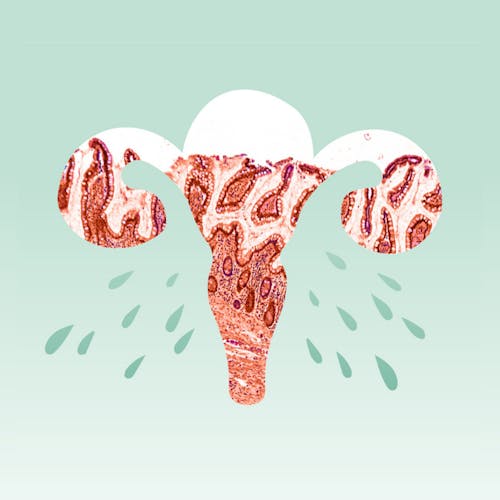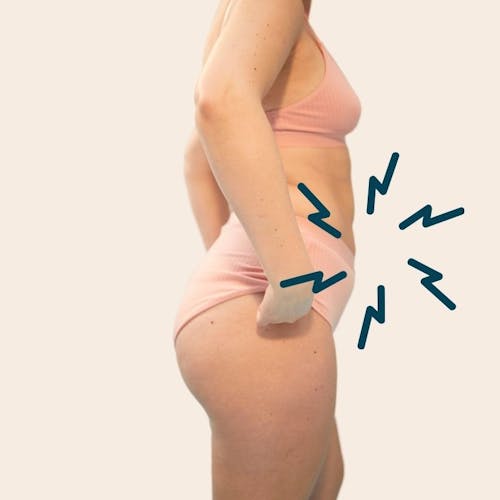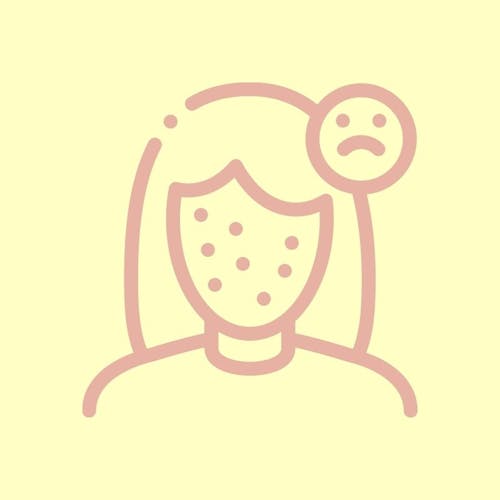This website uses cookies to enhance the user experience. By using Yoppie you are agreeing to our use of cookies.
Endometriosis Acne: Handling Endo Skin Problems
Written by Yoppie
26 Nov 2021
What is endometriosis?
What has acne got to do with endometriosis?
What can I do about endo acne?
Are there other skin conditions associated with endo?
It’s really affecting my mental health. What can I do?
Those with endometriosis really get the short end of the stick; painful tummies, sometimes debilitating periods, and the cherry on top? Acne. Turns out endometriosis and acne are more closely connected than you might think. We’re diving into why that is, the negative effects it can have, and what to do if acne is an issue for you. Let’s take a look...
What is endometriosis?
Endometriosis is a condition that causes tissue similar to the womb lining to grow outside the womb where it’s not supposed to, i.e. ovaries and fallopian tubes. There are treatments available, but endo is typically a long-term condition that many must learn to manage.
Symptoms often include heavy and painful periods, tummy pain, back or pelvis pain that worsens during periods, pain during or after sex, fertility issues, and more. An estimated 1 in 10 people of reproductive age in the UK suffer from endometriosis.
What has acne got to do with endometriosis?
Good question! Acne isn’t commonly noted as a symptom of endometriosis, although it can be one of the most frustrating and confidence-busting symptoms of all, with an estimated 1% of those with endo suffering from cystic acne. Endometriosis can lead to hormonal acne such as blackheads, whiteheads and painful cysts.
For some, endo can cause the skin to become sensitive, as those who suffer from it have inflammation in their bodies. A 2002 study of 3,680 women with endometriosis found they were more likely to suffer from asthma, allergies, and eczema.
In addition, hormones help regulate sebum production, and any excess can result in acne. Studies show those who suffered from bad acne as teens have a higher risk of endo, and one 2014 study researched the correlation between teenage acne and endometriosis. They found those with severe teenage acne had a 20% increased risk of endometriosis.
Lastly, if you choose to take hormonal birth control to manage endo symptoms (sometimes prescribed by doctors for this reason), this can also affect your skin.
What can I do about endo acne?
If endo is already negatively affecting your life, acne certainly won’t help. Here are some treatments for hormonal acne that you may wish to try out...
- Get more sleep: Aim for 8 hours minimum, but if you can get any extra, even better. Sleep regulates hormones, so catching more Zs can improve hormones and acne.
- Reduce stress: Stress has an adverse effect on hormone levels, and skin can suffer. Look closely at the most stressful parts of your day and try to reduce this somehow.
- Pay attention to skincare products: If you have hormonal acne, you may find it helps to switch to products that are non-comedogenic and won’t block pores.
- Don’t touch: Do you pick your spots? You’ll only make them worse. Be conscious about how often you touch your face each day, and try not to pop spots that come up.
- Eat a healthy diet: This point is debated, but healthy food can regulate hormones, so try to cut down on refined carbohydrates and sugars, and see if it helps your skin.
Are there other skin conditions associated with endo?
Endometriosis is the gift that just keeps on giving when it comes to skin conditions! In fact, if you have endo you have a higher chance of developing one of the below conditions:
- Lupus: An inflammatory condition that can cause hair loss and skin rashes, mainly in areas that are often exposed to sun. These days, lupus is easily managed with medication and a healthy lifestyle, so speak to your doctor about the best ways to manage lupus if you have it.
- Hives: Skin rashes like hives and other allergies are more likely to appear on those with endometriosis because their immune system is more sensitive to irritants.
- Unpredictable skin: Endometriosis is known to cause skin to react inconsistently. One day your skin could be clear and looking great, the next it’s acne central! This inconsistency can be hard to handle, as it is difficult to predict and plan ahead.
- Eczema: Eczema causes dry, flaky, red patches on skin and is more likely in those with endo. If you have eczema, speak to your doctor or a dermatologist before treating your skin, to make sure you are using the best option for your specific case.
It’s really affecting my mental health. What can I do?
Acne may not sound like a big deal, but only those who suffer from it will know how isolating and challenging it can be. In 2016, actor Daisy Ridley opened up about her ongoing struggle with endometriosis since age 15. One of the worst symptoms she faced was acne, and the stress of her condition caused her acne to flare up at the most inopportune time; while filming Star Wars: The Force Awakens. She said:
"To any of you who are suffering with anything, go to a doctor; pay for a specialist; get your hormones tested, get allergy testing; keep on top of how your body is feeling and don't worry about sounding like a hypochondriac. From your head to the tips of your toes, we only have one body, let us all make sure ours are working in tip-top condition, and take help if it's needed.” - Daisy Ridley, Actor
We couldn’t have said it better. Don’t suffer in silence if your endo or acne is making you unhappy - speak to someone who can help. Do you have questions about endometriosis or acne? Join our Full Stop FB group to chat about your own experience, or ask us anything you like on Instagram at @itsyoppie. Don't forget that our personalised menstrual care package can get full-cycle care including endometriosis supplements & organic tampons delivered easily and regularly through your letterbox so you can get on with living!
Section jump
Back to top
Subscribe To Our Newsletter
YOPPIE





© 2026 Yoppie is a registered trademark of Phlo Technologies Ltd.
Yoppie's supplements are not a substitute for a varied diet and healthy lifestyle and are not intended to diagnose, treat, or cure any disease. If you are pregnant, breastfeeding, have a medical condition or are under medical supervision, please consult with your doctor before taking any of our products.







